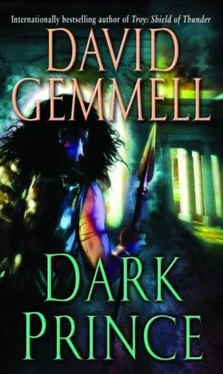Alexander's eyes changed colour, swirling back to the sea-green Philo remembered from the past.
'What is happening, Philo?' whispered the King, his voice soft. Philo hesitated. . then a spear rammed through his unprotected back, ripping into his lungs and heart. He reared up, and a second guard drove his blade into the dying man's chest.
Blood gushed from Philo's mouth and he slumped to the floor beside the semi-conscious Alexander. The King rose shakily, then backed away from the corpse. 'Where is Hephaistion? I need Hephaistion!' he cried.
Craterus moved alongside him. 'He is gone, sire, to Rhodes, to fetch the Lady Aida.'
'Rhodes?'
'Let me take you back to your rooms, sire.'
'Yes. . yes. Where is Parmenion?'
'In Elam, sire. But do not concern yourself. He will be dead by tomorrow. I sent three of our finest swordsmen.'
Alexander groaned, but for a moment he said nothing. He could feel the Dark God fighting back inside him, storming the bastions of his mind. Yet he held on and drew in a deep breath. 'Get me to the stables,' he ordered Craterus.
'The stables? Why, sire?'
'I need to stop them, Craterus.'
'You cannot ride out alone. You have enemies everywhere.'
The King looked up into the earnest young man's eyes. 'I am not insane, Craterus. But there is… a demon inside me.
You understand?'
'A demon, sire, yes. Come and rest. I will send for the surgeon.'
'You don't believe me? No, but then why should you? Leave me!'
Alexander pushed Craterus away and ran down the long corridor, emerging into the bright sunshine of the courtyard.
Two sentries snapped to attention, but he ignored them and continued to run along the tree-lined road to the royal stables.
Bucephalus was in the eastern paddock and his great head lifted as he saw the King. 'Come to me!' called Alexander.
The black stallion trotted to the fence and Alexander opened the gate, took hold of the black mane and swung himself to Bucephalus' back.
There were shouts from the west and the King turned to see Craterus and several of the officers running after him.
Alexander kicked Bucephalus into a run and rode for the south-east, through the royal park and out on to the road to Elam. The city was some sixty miles away on the coast, the road petering out into rocky tracks and high hills.
There were robbers in the hills, savage tribesmen who looted many of the trade caravans from the east, but Alexander did not think of them as he rode. Instead he pictured the Spartan, remembering his gallantry in the lands of the Enchantment and his quiet counsel in the years that followed. Now there were assassins on their way to kill him.
Sent by me!
No, not by me. Never by me!
How could I have been so foolish, thought Alexander. The moment his father had torn the necklet from his throat he had felt the surging force of the Dark God. But he had believed he could control the evil, holding it back, using it when necessary. Now he knew that even that belief had been merely one more example of the cunning of Kadmilos.
Kadmilos! Even as he thought the name of the Beast he could feel the claws of power pulling at his spirit, drawing him down, the dizziness beginning. .
'No!' he shouted. 'Not this time!'
'You are mine,' came the whispering voice from deep within him.
'Never!'
'Always,' came the response. 'Look on, Alexander — and despair!'
The hidden doors of his memory opened and he saw again the murder of Philip, but worse than this he saw himself the night before, speaking with Pausanius and urging him to seek revenge. 'When I am King,' he heard himself saying, 'your rewards will be great indeed.'
'Poor, naive Pausanius,' whispered the voice in his mind. 'How surprised he was when you leapt across the body of the fallen King and plunged your sword into his chest.'
Alexander's spirit reeled from the shock. There was no doubting the vision. For years he had practised self-deceit, never daring to search for the truth. Other images swarmed into his mind — the death and mutilation of Philip's wife and son, the killing of Cleitus and Mothac, the murder of Theoparlis. . loyal, trusting Theoparlis.
The King cried out as he rode and the demon within him laughed and rose.
'No,' said Alexander again, quelling the emotions of hatred and fear, hauling himself clear of self-reproach and guilt.
'Those deeds were yours, not mine.' His concentration deepened and he pushed the demon back.
'You cannot resist me for long,' Kadmilos told him. 'You will sleep, and I will rise.'
It was true, but Alexander did not allow the fear to dominate his thinking. The cowardice of Kadmilos — his spirit fleeing as the point of Philo's dagger touched the skin of Alexander's throat — had given the King one last chance at redemption, and his thoughts were of Parmenion as he rode.
The great stallion galloped on, seemingly tireless, the drumming of his hooves echoing through the hills.
'Father Zeus,' prayed Alexander, 'let me be in time!'
Parmenion awoke from a dream-filled sleep and sat up, pushing back the thin sweat-soaked sheet. The sky beyond the narrow window was streaked with grey as he climbed from the bed and padded across to the small table where last night's pitcher of wine still stood. It was almost empty, but he poured the dregs into a goblet and drained it.
He was about to return to his bed when he turned and caught sight of his naked body reflected in a mirror of polished brass. His hair was white now, and thin, his face lean and sharp, the hawk-nose more prominent than ever. Only the pale blue eyes were the same. He sighed and dressed in a simple chiton of silver grey, then belted on his dagger before walking down to the long gardens behind the house.
Dew lay upon the leaves and the morning was chill as he strolled the winding paths, halting by a ribbon of a stream that gushed over a bed of coloured crystals.
Seventy years — fifty of them as a general.
He shivered and walked on.
Parmenion. The Death of Nations. So many he could no longer find their names within his memory. The early days were the easiest to recall: the fall of Spartan power, the defeat of Illyria, Paionia and Thrace. The sack of the Chalcidice, the overthrow of Thebes. .
But the last few years had seen the destruction of dynasties too many to recall: Phrygia, Cappadocia, Pisidia, Cilicia, Syria, Mesopotamia, Persia, Parthia. .
The stream opened out on to a wide pond around which statues had been set. A leopard, beautifully crafted and vividly painted, stood at the edge of the pool leaning its head forward as if to drink. A little distance away stood a striped horse, and beyond that several deer. All still, motionless, frozen in time.
The sun broke through in the east, the warmth touching the Spartan but not lifting his spirits. He walked on towards the eastern wall. There were alcoves there, fitted with carved wooden seats.
In the furthest of these Parmenion seated himself, looking back across the pond and up towards the great house with its rearing columns and red-tiled roof.
Some ten paces to his left sat a stone lion. Unlike the other animals in the garden, he was not painted; his great albino head was cocked to one side, as if listening, and the muscles of his flanks were magnificently rendered. Parmenion found the statue to be among the best he had ever seen, wondering why he had never noticed it before.
As the Spartan stared the lion suddenly moved. Slowly and with great grace it stood, and stretched its muscles of marble. Parmenion blinked and focused on the statue. The lion was still again, returning to its former position with head cocked.
Читать дальше












